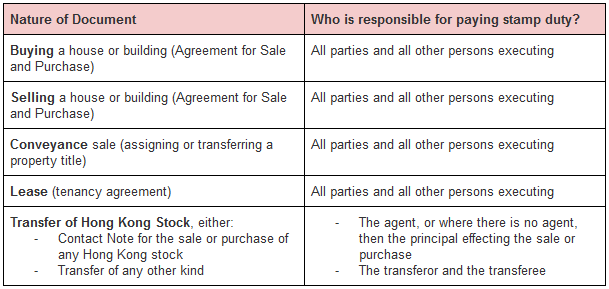
Note: This Oneday.com.hk stamp duty article serves as a guide to paying stamp duty in Hong Kong. In case of doubt, please refer to the relevant Hong Kong IRD regulations or seek advice from legal professionals. Additionally, this OneDay.com.hk blog article will focus on stamp duty in relation to the sale, transfer, and or lease transactions of Hong Kong property.
To calculate Hong Kong stamp duty payable, please visit the Hong Kong stamp duty calculator page on the Oneday.com.hk blog.
In an effort to dampen the escalating property prices across residential, commercial and industrial property in Hong Kong, the Hong Kong Government has made a number of changes to the Hong Kong Stamp Duty Ordinance.
These changes include legislation for a new Special Stamp Duty (SSD) to deter house flipping, as well as new, higher Ad Valorem (AVD) rates for non-Hong Kong permanent residents and/or multiple property owners (Buyer’s Stamp Duty or BSD), and for the first time, new AVD rates rates for non-residential property transactions as well.
The recent changes to the Hong Kong Stamp Duty Rates reflect higher rates, which will no doubt have some influence on Hong Kong’s notoriously expensive property market.
In basic terms, stamp duty is a duty (also known as a tax) imposed by the Hong Kong Government on the legal recognition of certain documents and paid to the government. In other words, when someone buys, sells, or transfers real estate (e.g. a house or a building) in Hong Kong, stamp duty (tax) must be paid to the government.
Stamp duty in Hong Kong has been around for a long time. It was introduced in Hong Kong in 1866 by the British Hong Kong colonial government on all written legal documents. Stamp duty remained throughout Britain’s rule of Hong Kong and it was even retained by the Hong Kong Special Administrative Region (SAR) after the 1997 transfer of sovereignty over Hong Kong from Britain back to Mainland China.
Stamp duty was originally introduced to cover the administrative cost of the written legal documents (sometimes called ‘written instruments’) that are incurred when processing a property transaction. For example, written legal documents could include an ownership title of a property, or a document highlighting a database search to ensure someone is buying the correct property from the right person).
However, the purpose of stamp duty has evolved over time and, nowadays, stamp duty is a tool that can be used to achieve a number of social and economic outcomes, including the following:
Despite the fact that stamp duty can drastically alter the cost of buying a property, overall, there seems to be a reasonable level of public acceptance for stamp duty on property in Hong Kong. This is especially so for Hong Kong Permanent Residents looking to get on the property ladder with their first residential property because this category of property purchasers are eligible to pay significantly lower stamp duty rates calculated at the original, lower scale (see AVD Scale 2). However, the recent introduction of stamp duty rates for non-residential in 2016 has some businesses concerned.
Regardless, given the notoriously high demand for all types of property in Hong Kong, coupled with the consistent shortage of land provisioned by the Hong Kong Government for the development of new property, it remains to be seen whether and how this new measure could effectively contain the heat in Hong Kong’s red hot property market in the long-run.
In Hong Kong, there are several situations when stamp duty must be paid. Below are the main examples of where stamp duty can be applied:
Generally, the individual (or company) responsible for paying stamp duty depends on whether the individual or company is buying, selling, or conveyancing a property in Hong Kong.
However, the Hong Kong IRD website clearly states that the buyer and the seller (and any person who uses the instrument) will be jointly and severally liable to pay AVD Stamp Duty, be it calculated at Scale 1 or Scale 2 rates. In other words, the buyer and seller and any person who uses the instrument will have the same extent of liability, under the law, to pay for any AVD payable on the chargeable instruments, irrespective of any agreement to the contrary made between them. See table 1 below.
If you are considering buying or selling property in Hong Kong, always seek legal and tax advice on your liability for paying stamp duty before entering into any Provisional Agreement for Sale and Purchase.
Individuals or companies who are liable to pay stamp duty will vary according to the nature of documents as follows:

There are four main types of stamp duty. Under certain scenarios it may be possible that a buyer or seller has to pay multiple stamp duties: Below are the four main types:
The below diagram (Diagram 1) and table (Table 2) outlines the eligibility of Hong Kong Permanent Residents and First Home Buyers to pay lower stamp duty rates under the original AVD scale (Scale 2) or the new, higher, AVD scale (Scale 1) - see Table 2 below
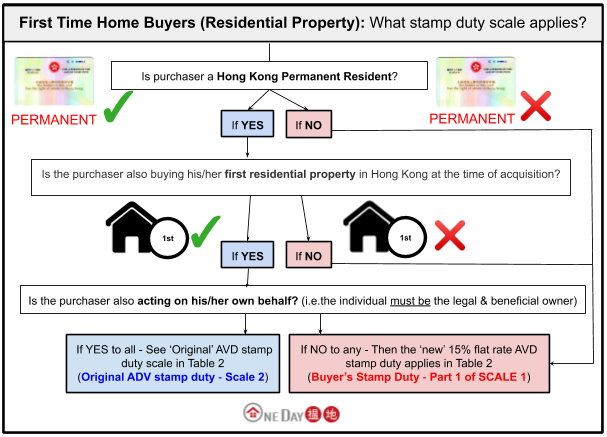
The below table outlines the different Hong Kong stamp duty rates for residential and non-residential property, effective since 5/11/2016
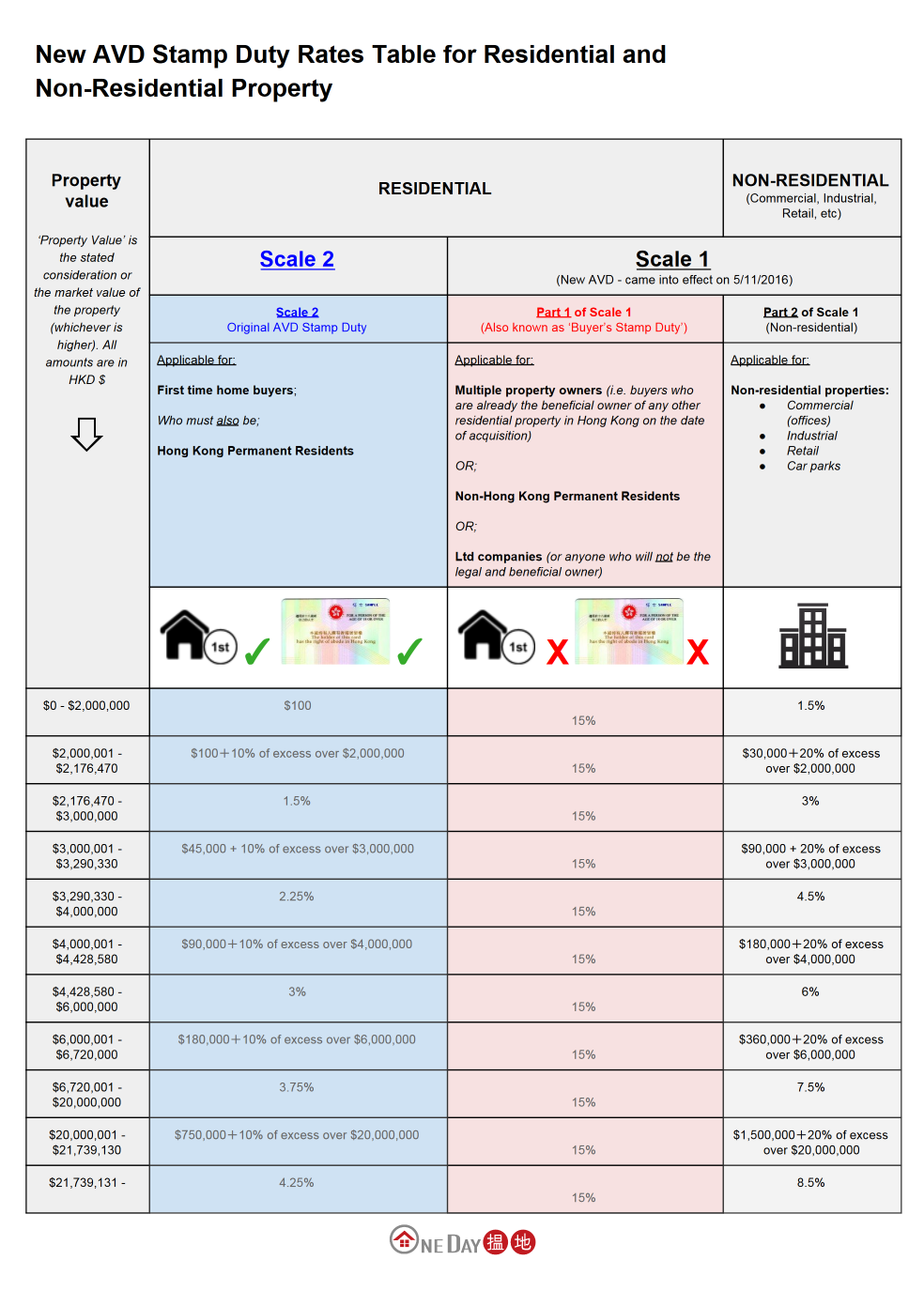
| Property value (HKD) | Scale 2 AVD | Scale 1 AVD - effective 5/11/2016 | |
|---|---|---|---|
| Original AVD Stamp Duty | Part 1 of Scale 1 (Buyers Stamp Duty*) | Part 2 of Scale 1 (Non-residential) | |
| $0 - $2,000,000 | 100 | 15% | 1.5% |
| $2,000,001 - $2,176,470 | $100+10% of excess over $2,000,000 | 15% | $30,000+20% of excess over $2,000,000 |
| $2,176,471 - $3,000,000 | 1.5% | 15% | 3% |
| $3,000,001 - $3,290,330 | $45,000 + 10% of excess over $3,000,000 | 15% | $90,000 + 20% of excess over $3,000,000 |
| $3,290,331 - $4,000,000 | 2.25% | 15% | 4.5% |
| $4,000,001 - $4,428,580 | $90,000+10% of excess over $4,000,000 | 15% | $180,000+20% of excess over $4,000,000 |
| $4,428,581 - $6,000,000 | 3% | 15% | 6% |
| $6,000,001 - $6,720,000 | $180,000+10% of excess over $6,000,000 | 15% | $360,000+20% of excess over $6,000,000 |
| $6,720,001 - $20,000,000 | 3.75% | 15% | 7.5% |
| $20,000,001 - $21,739,130 | $750,000+10% of excess over $20,000,000 | 15% | $1,500,000+20% of excess over $20,000,000 |
| $21,739,131 - | 4.25% | 15% | 8.5% |
*Unless specifically exempted, Buyer’s Stamp Duty (BSD) is payable on an agreement for sale, or a conveyance on sale, for the acquisition of any residential property executed on or after 27 October 2012, except where the purchaser, or the transferee, is a Hong Kong permanent resident (HKPR) acquiring the property on his/her own behalf (i.e. the person is both the legal and beneficial owner).
Special Stamp Duty (SSD) is a duty paid by sellers of Hong Kong residential property. Special Stamp Duty was enacted by the Legislative Council on 27 February 2014 and took effect retrospectively from 27 October 2012 in an effort to minimise speculative property investing where buyers purchase residential property with the intention of reselling within a short time period for a profit. This type of speculative property investment is sometimes referred to as ‘house flipping’.
In a rising property market, house flipping can lead to escalating house prices where a property sells for higher and higher amounts each time and to the point where only the wealthy can afford to buy or invest in property. In this situation, imposing a stamp duty can slow down household mobility, preventing people from moving house due to the extra costs so that the property market can rise at a slower and more manageable way and make home ownership more achievable for more people.
Special Stamp Duty (SSD) must be paid whenever an individual or company acquires a property and then resells it within a short time period (see Table 3 below for rates). Imposing stamp duty on ‘house flippers’ discourages house flipping activity meaning that the property market rises at a more manageable rate.
Unless otherwise exempt, Special Stamp Duty (SSD) is payable whenever a property is bought and then resold within a 36 month period. Property owners who buy and hold their property long-term (i.e. more than 36 months) won’t be affected by Special Stamp Duty (SSD).
Unless otherwise exempted, the seller and the buyer should, by consent, specify in the Provisional Agreement for Sale and Purchase (PASP) and the Agreement for Sale and Purchase (ASP) which party (the buyer or the seller) shall pay the Special Stamp Duty (SSD). If it is agreed that the Special Stamp Duty (SSD) should be paid by the seller, we suggest the buyer specify in the PASP and ASP that he will withhold part of the sale proceeds to pay for the Special Stamp Duty (SSD).
To calculate the correct Special Stamp (SSD) Duty rate, use the table below. The Special Stamp Duty (SSD) rate payable depends on the holding period of the property and is calculated by reference to the stated consideration or the market value of the property (whichever is higher):
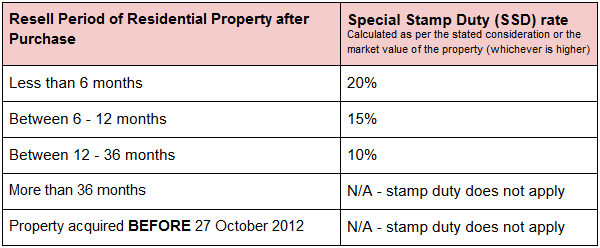
Buyer’s Stamp Duty (BSD) is an additional tax on non-permanent-resident individual buyers and non-permanent company buyers. The buyer’s stamp duty has to be paid upfront.
Unless specifically exempted, Buyer’s Stamp Duty (BSD) is charged at 15% on the stated consideration or the market value of the property (whichever is higher). See Table 2 (Part 1 of Scale 1).
Unless otherwise exempted, the buyer or the transferee (i.e. anyone receiving a property from another person) is responsible for paying the Buyer’s Stamp Duty (BSD)
For the lease of immovable property in Hong Kong, stamp duty is calculated at rates which vary with the term of the lease as follows:
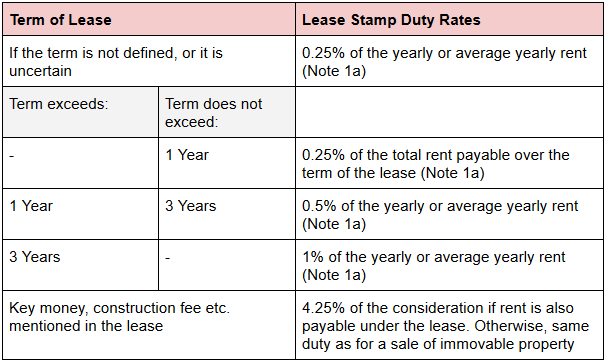
Note 1a: The yearly rent, average yearly rent, or total rent has to be rounded up to the nearest $100. Any deposit which may be mentioned in the lease will not be taken into account in assessing the stamp duty.
Since the introduction of the new AVD Stamp Duty in November 2016, the stamp duty rates have increased.
The new rates of stamp duty on the purchase of both residential and non-residential properties are a significant leap from the original stamp duty rates, in fact, they are nearly double the original rate, which is why they are often described as ‘Double Stamp Duty’ (Scale 1 of the new AVD).
Under the new regime, where purchases by non-Hong Kong permanent residents and/or if the purchaser already owns another residential property at the time of the subsequent purchase, the purchaser will have to pay approximately double the normal stamp duty up to a ceiling of 8.5% on Hong Kong properties valued at HKD $2 million or more.
Just about every party involved in the sale, purchase, or conveyance (i.e. transfer or assignment) of immovable property in Hong Kong is expected to pay some form of stamp duty. However under certain conditions, some parties could be eligible to pay lower rates of stamp duty, or even no stamp duty at all, depending on the situation. The availability of stamp duty exemption or relief may depend on who is involved, the type of arrangement or the type of Hong Kong property involved.
General exemptions and relief from stamp duty includes:
For more information or to check if you are eligible for stamp duty exemption, please refer to the Hong Kong SAR Inland Revenue Department and seek professional legal and or tax advice on your liability for paying stamp duty before entering into any Provisional Agreement for Sale and Purchase.